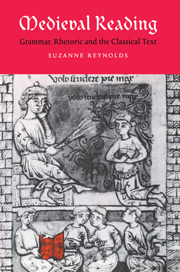Book contents
- Frontmatter
- Contents
- Acknowledgments
- Abbreviations
- 1 Introduction
- Part I CONTEXTS FOR READING
- Part II READING PRACTICE
- 4 Origins and mythologies: the invention of language and meaning
- 5 Reading word by word 1: the role of the vernacular
- 6 Reading word by word 2: grammatical and rhetorical approaches
- 7 From words to the phrase: the problem of syntax
- 8 Government: the theory and practice of a grammatical concept
- 9 Rival orders of syntax: vernacular, natural and artificial
- 10 From the phrase to the text: grammatical and rhetorical approaches again
- 11 Naked intention: satire and a new kind of literal reading
- 12 Literacy: a new model for the classical text in the Middle Ages?
- Notes
- Select bibliography
- General index
- Index of manuscripts
- Cambridge Studies in Medieval Literature
4 - Origins and mythologies: the invention of language and meaning
from Part II - READING PRACTICE
Published online by Cambridge University Press: 22 September 2009
- Frontmatter
- Contents
- Acknowledgments
- Abbreviations
- 1 Introduction
- Part I CONTEXTS FOR READING
- Part II READING PRACTICE
- 4 Origins and mythologies: the invention of language and meaning
- 5 Reading word by word 1: the role of the vernacular
- 6 Reading word by word 2: grammatical and rhetorical approaches
- 7 From words to the phrase: the problem of syntax
- 8 Government: the theory and practice of a grammatical concept
- 9 Rival orders of syntax: vernacular, natural and artificial
- 10 From the phrase to the text: grammatical and rhetorical approaches again
- 11 Naked intention: satire and a new kind of literal reading
- 12 Literacy: a new model for the classical text in the Middle Ages?
- Notes
- Select bibliography
- General index
- Index of manuscripts
- Cambridge Studies in Medieval Literature
Summary
It seems that every culture has the urge to mythologise, or, to use Barthes' words, to ‘transform history into nature’. Of course, the choice of object to be naturalised betrays the anxieties and preoccupations of the mythologisers, but so do the methods and forms they adopt. These forms are the strategies with which a culture seeks to allay its anxieties, creating a fiction that gives shape to the unknowns of the past and, in doing so, explains the present. The contingent and the man-made become natural. This naturalisation is the fundamental impulse behind medieval myths of the invention of language. Written in the context of a culture which is characterised by a constantly shifting multi-lingualism, these accounts were obstinately founded in the idea that language was created at a given moment, in a definable manner. It was a single event, not a process. Moreover, language was initially a single language, imposed on to a primal scene of confusion so that the primitive, languageless inhabitants of the earth might communicate with each other. It took the form of individual names imposed on to individual things, and its basic currency was the word, distinct, utterable and most important of all, significant. In this way, the individual word became the essential part of the medieval economy of language, and the foundation of grammatica's operations.
- Type
- Chapter
- Information
- Medieval ReadingGrammar, Rhetoric and the Classical Text, pp. 45 - 60Publisher: Cambridge University PressPrint publication year: 1996



